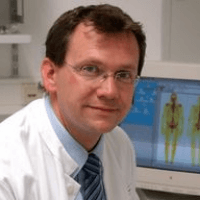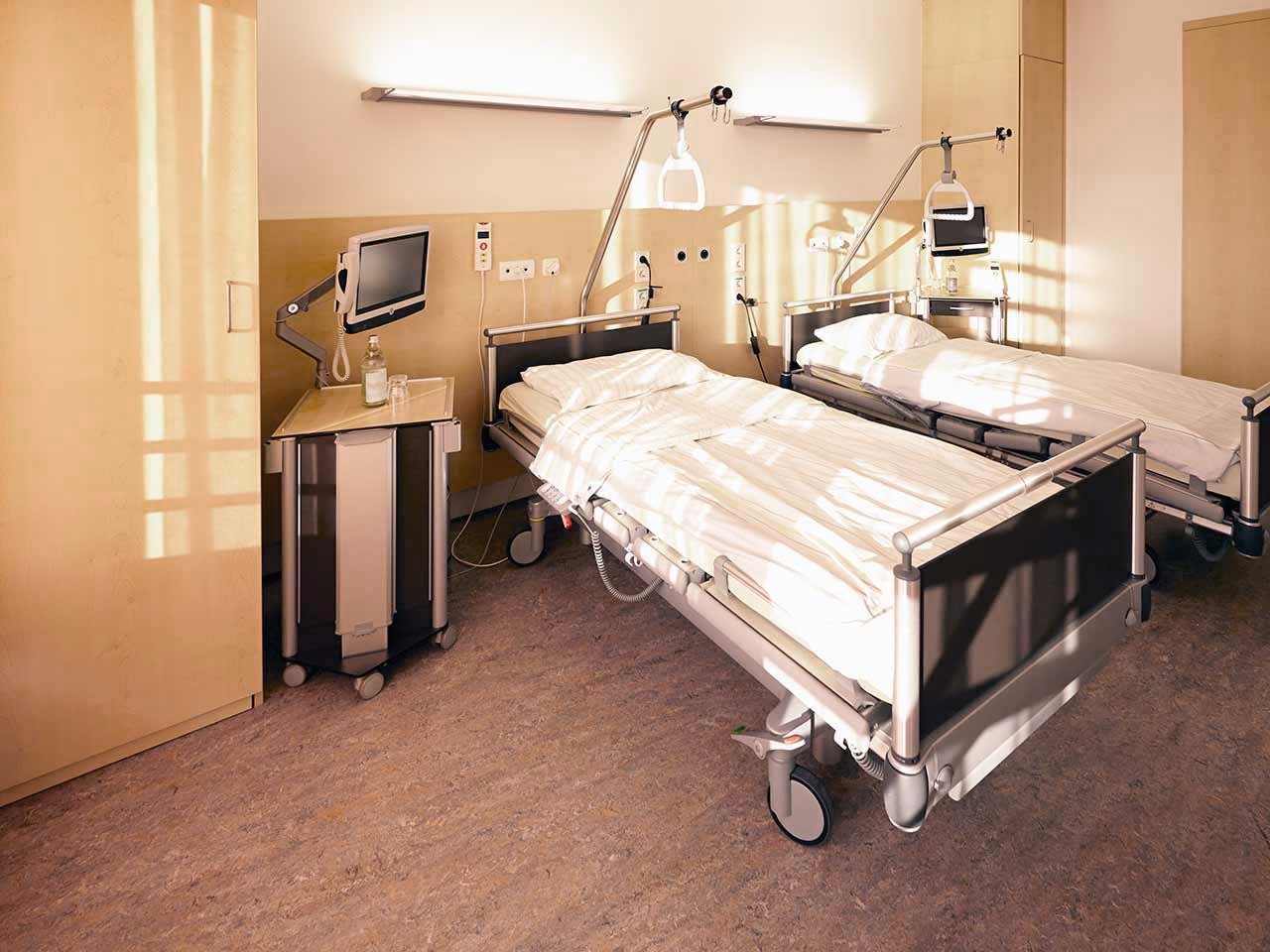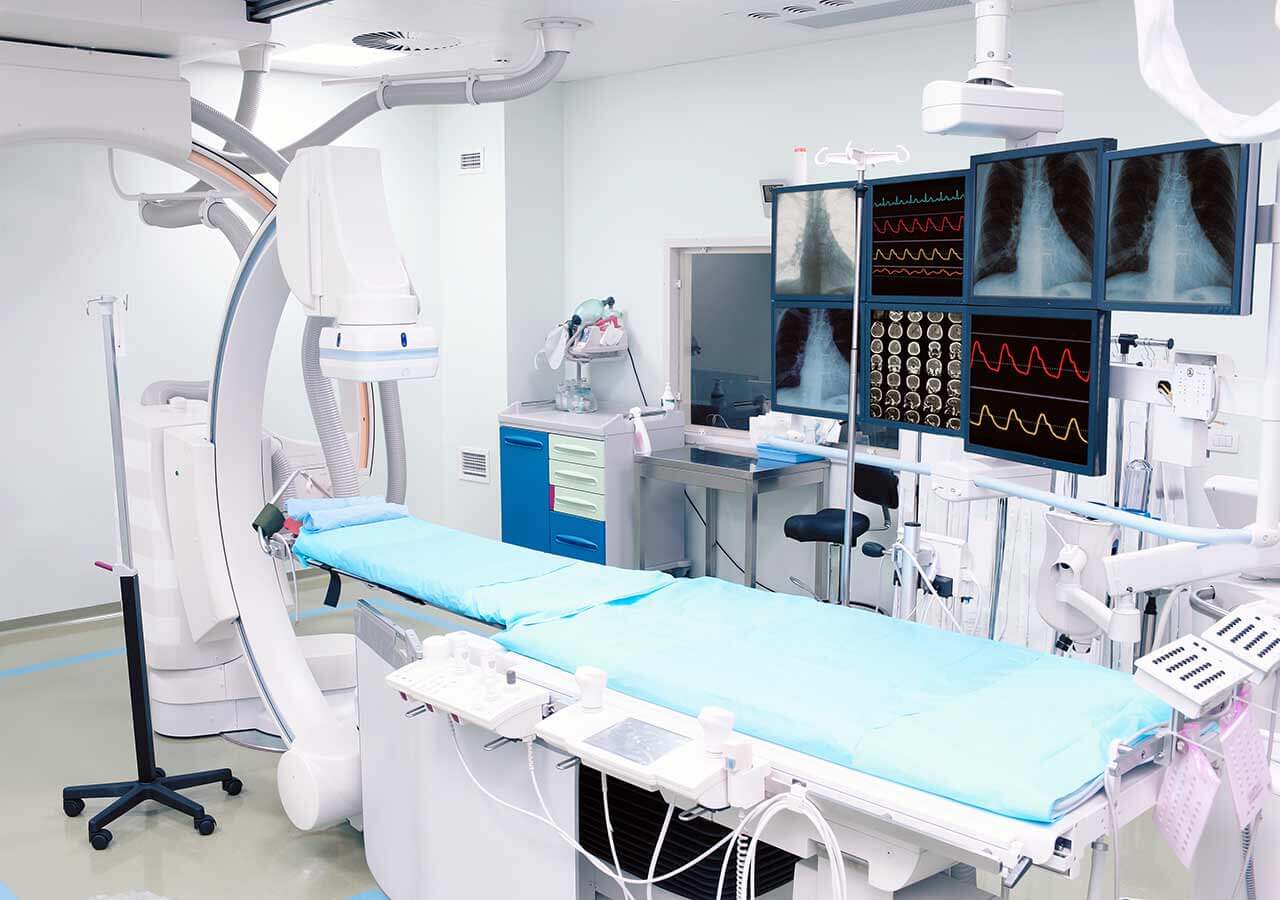
The program includes:
- Initial presentation in the hospital
- Clinical history taking
- Evaluating the available medical reports
- General clinical examination
- Urological examination
- Laboratory tests:
- Complete blood count
- Biochemical analysis of blood
- Inflammation indicators (CRP, ESR)
- Indicators of blood coagulation
- Tumor markers, PSA
- Ultrasound scan of the urogenital system
- CT scan/MRI of the abdomen and pelvis
- Preoperative care
- Removal of prostate tumor metastases with a gamma probe
- Consultations of related specialists
- Symptomatic treatment
- Cost of essential medicines
- Nursing services
- Control examinations
- Stay in the hospital with full board
- Accommodation in 2-bedded ward
- Recommendations regarding further treatment
Indications
- Confirmed prostate cancer with suspected metastasizing
How program is carried out
During the first visit, the physician will conduct a clinical examination and go through the results of the available examinations. After that, you will undergo the necessary additional examination, such as the assessment of liver and kidney function, ultrasound scan of the abdominal and pelvic organs. Based on the results, the physician will determine the number and localization of metastases, and plan the upcoming intervention.
On the eve of the intervention, you will receive an injection of radioactively labeled PSMA. PSMA is the substance that binds to the smallest prostate cancer metastases in the lymph nodes and other tissues. The radioactive label will allow the surgeon to find all the metastases during the operation.
Removal of prostate tumor metastases with a gamma probe starts with general anesthesia. After anesthesia, the surgeon makes small incisions through which he inserts endoscopic instruments, a gamma probe and a video camera into the pelvic cavity and abdominal cavity. The gamma probe detects the lymph nodes affected by metastases by a radioactive label, and the surgeon removes them endoscopically. The video camera continuously transmits a three-dimensional image of the operating field in 12-fold magnification to the monitor.
As the surgeon sees the operating field in multiple magnification, he preserves the nerve endings and large blood vessels. This significantly reduces the surgical risks. The gamma probe, in turn, allows detecting and removing all metastases, which minimizes the risk of prostate cancer recurrence.
After the completion of the operation, you will be transferred back to the ward, under the supervision of the attending physician and nursing staff. Due to the minimal invasiveness of the operation and the short duration of general anesthesia, you will not need to stay in the intensive care unit for a long time.
Finally, the attending physician will evaluate the results of control examinations, schedule the date of discharge from the hospital and give you detailed recommendations for further follow-up and treatment.
Required documents
- Medical records
- PSA blood test
- MRI/CT scan (not older than 3 months)
- Bone scintigraphy (if available)
- Biopsy results (if available)
Service
You may also book:
 BookingHealth Price from:
BookingHealth Price from:
About the department
The Department of Nuclear Medicine University Hospital Jena offers the full range of radioisotope diagnostics and treatment using the state-of-art gamma cameras and PET-CT systems. All medical services comply with the guidelines of national and international professional societies, which ensures an accurate diagnostics and optimal treatment outcome. The department is headed by PD Dr. med. Martin Freesmeyer.
The main therapeutic options of the department include radioiodine therapy, selective internal radiotherapy, peptide-receptor radionuclide therapy. A therapeutic method is selected depending on the specific clinical case. For example, selective internal radiation therapy (SIRT) is more effective in intensive vascularization of liver tumors. The SIRT-therapy is the most widely used in the treatment of hepatocellular carcinoma and liver metastases in breast, colon or neuroendocrine cancers. The radioiodine therapy is effectively used in the treatment of hyperthyroidism in order to reduce the size of the thyroid gland, as well as for the treatment of the thyroid cancer recurrences.
The service range of the department includes:
- Conventional diagnostics using gamma cameras
- Scintigraphy in inflammatory processes
- Myocardial scintigraphy
- Lung scintigraphy
- Parathyroid scintigraphy
- Renal scintigraphy
- Thyroid scintigraphy
- Skeletal scintigraphy
- PET-CT diagnostics (innovative diagnostic method, which combines positron emission tomography and computed tomography)
- Therapeutic services
- Radioiodine therapy
- Radiosynovectomy
- Selective internal radiation therapy
- Peptide receptor radionuclide therapy
- Other diagnostic and therapeutic services
Curriculum vitae
Education
- 01.10.1990 - 17.09.1996 Study of Human Medicine at the Friedrich Schiller University Jena.
- 01.10.1995 - 06.09.1996 One-year practice, optional course (Radiation Therapy), Friedrich Schiller University Jena.
- 20.09.1996 Permission to work as an Intern.
- 01.05.1998 Admission to medical practice.
Professional Career
- 01.09.1988 - 30.09.1990 Department of Anaesthesiology and Intensive Care, University Hospital Jena.
- 01.10.1988 - 31.01.1990 Medical service, military service.
- 01.11.1996 - 31.03.1997 Institute of Pathology, Friedrich Schiller University Jena, Intern.
- 01.04.1997 - 30.04.1998 Department of Anesthesiology and Intensive Care, University Hospital Jena, Intern.
- 01.05.1998 - 31.12.2003 Institute of Diagnostic and Interventional Radiology, Friedrich Schiller University Jena, Advanced Training.
- Since 13.02.2003 Board certification in Diagnostic Radiology, Senior Physician.
- 01.01.2004 - 30.04.2007 Department of Nuclear Medicine, University Hospital Halle, Advanced Training.
- Since 26.01.2007 Board certification in Nuclear Medicine.
- Since 01.05.2007 Head of the Department of Nuclear Medicine at the University Hospital Jena.
Scientific Career
- 03.05.1999 PhD thesis defense with honors, Medical Faculty, University of Jena. Subject: "Histomorphometric researches of the cancellous bone in rat after the removal of the parathyroid glands: the effect of physiological doses of parathyroid hormone and calcitriol".
- 09.09.2014 Completion of the habilitation procedure, Faculty of Medicine, University of Jena. Subject: "Developments and examinations on the thyroid imaging: PET/CT with iodine-124, 3D ultrasound examination and nuclear sonographic image fusion".
Patent Applications
- Hybrid imaging system for intraoperative, interventional and diagnostic purposes, German Patent and Trade Mark Office (registration, November 2012).
- Method for the determination of the origin of the radiation signal in the measuring range and the measuring device for the simultaneous detection of decaying radionuclides in the measuring range, German Patent and Trade Mark Office (registration, June 2014).
Honors
- 01.2009 Clinician of the Year (9 semester).
- 2010 - 2014 Nomination for the title of the Clinician of the Year.
- 01.2014 "Award for Outstanding Academic Activities" (9 semester).
Membership in Professional Societies and Associations
- German Society of Nuclear Medicine (DGN).
- German Society of Ultrasound in Medicine (DEGUM).
- Teacher of the Section of Radiology, DEGUM.
- Teacher of the Section of Pediatrics, DEGUM.
- Society of Nuclear Medicine Sachsen (GNS).
- German Society of Radiology(DRG).
- Thuringian Society of Radiology and Nuclear Medicine (TGRN).
- Professional Association of German Specialists in Nuclear Medicine (BDN).
- Professional Federation of German Radiologists (BDR).
- Association of Leading Senior Physicians (VLK).
- German Association of Higher Education Institutions (DHV).
- Financial Support Foundation of the University Hospital Jena.
Board Member in Professional Societies and Associations
- Society of Nuclear Medicine Sachsen (GNS).
- Thuringian Society of Radiology and Nuclear Medicine (TGRN).
- Financial Support Foundation of the University Hospital Jena.
Photo of the doctor: (c) Universitätsklinikum Jena
About hospital
According to the prestigious Focus magazine, the University Hospital Jena regularly ranks among the top German medical facilities!
The hospital has positioned itself as a multidisciplinary medical facility with a long history of more than 200 years. Since its foundation, the hospital has been constantly developing and modernizing, thanks to which nowadays it offers patients the highest level of treatment in Germany based on the use of innovative technologies and the very latest therapeutic techniques. The hospital consists of 26 specialized departments and 25 research institutes. It treats more than 53,600 inpatients and about 274,000 outpatients every year. The staff of the hospital includes more than 5,600 competent doctors.
The extensive resources of the university hospital, high treatment standards, and the introduction of new research developments provide first-class treatment in Germany meeting the stringent international standards. The hospital has an excellent reputation not only in Germany, but also far beyond its borders, due to which it accepts a large number of foreign patients for the diagnostics and treatment.
Despite the technical progress and the availability of accurate computerized systems, the patient’s physical health and emotional state is the main value of each employee of the hospital, since some diagnoses cause emotional distress in patients. The doctors of the hospital believe that the key to a successful result is a comprehensive and individual approach, so they spend a lot of time talking with patients, listen carefully to all their wishes and support at all stages of the therapeutic process. All this in combination with high-precision diagnostic techniques and the very latest types of therapy forms a solid basis for the achievement of an optimal treatment result.
Photo: (c) depositphotos
Accommodation in hospital
Patients rooms
The patients of the University Hospital Jena live in comfortable single and double rooms made in a modern design. Each patient room is equipped with an ensuite bathroom with shower and toilet. The room has enough space to store personal belongings, as well as a table and chairs for receiving visitors. A bedside table can be converted into a table so that patients can eat right in their bed. Each room has a TV, and there is also access to the Internet. In addition, the hospital offers enhanced-comfort rooms.
Meals and Menus
The patient and his accompanying person have a daily choice of three menus. If for some reason the patient does not eat all the foods, he will be offered an individual menu. Please inform the medical staff about your dietary preferences prior to the treatment.
Further details
Standard rooms include:
Religion
Religious services are available upon request.
Accompanying person
During the inpatient program, an accompanying person may stay with you in a room or at the hotel of your choice.
Hotel
During the outpatient program, you can live at a hotel of your choice. Managers will help you to choose the most suitable options.





